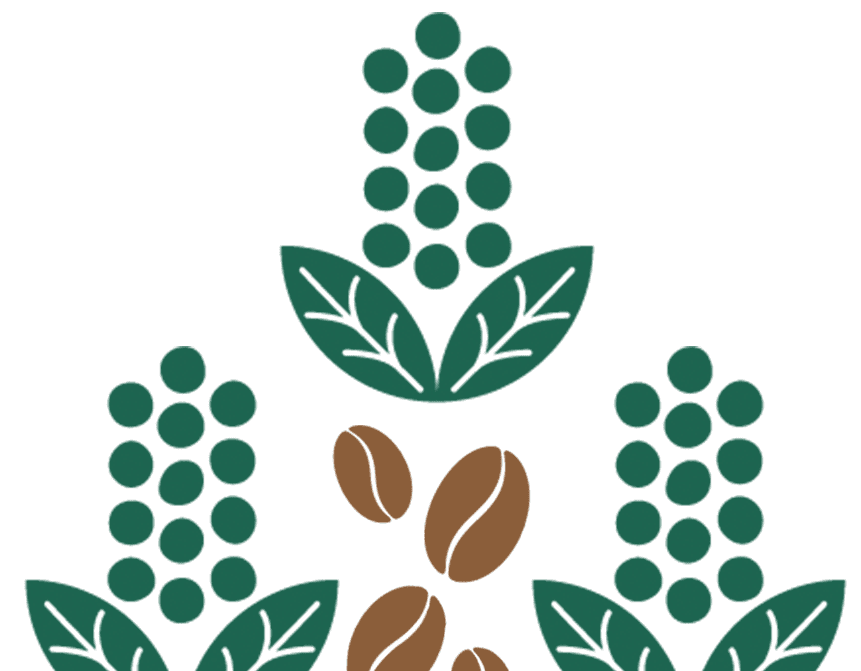Is Brazil the dominant global coffee producer? Does Brazil export specialty coffee, or do they keep it for themselves?
Many cities around the world have coffee cafes on almost every street corner. It comes as no surprise to you that coffee is one of the most beloved beverages consumed by millions of people around the world.
Also, with coffee being the second most popular consumed beverage in the world after water, you can understand why coffee beans are in high demand almost everywhere.
The top-producing countries that meet the demand of eager consumers, each produce billions of kilograms of coffee beans that are enjoyed by their customers. According to the International Coffee Organization, in 2020, a total of 169.6 million 60-kilogram bags of coffee were produced globally.
This article is all about Brazil’s amazing coffee production. We’ll look at how it all started, what’s happening now, and why Brazil is the top coffee producer in the world. We’ll also talk about how Brazilian coffee affects the whole world and what the future holds for this delicious drink
Passionate About Coffee?
Most people who love coffee will say that drinking it is a special experience. It’s not just the rich smell and cozy feeling, but also the nice tradition of sitting down and enjoying a fresh, hot cup.
Coffee is very popular because it can be made and served in many different ways. It also gives us energy because of the caffeine. That’s why coffee lovers have learned to connect the bitter taste with feeling energetic and happy.
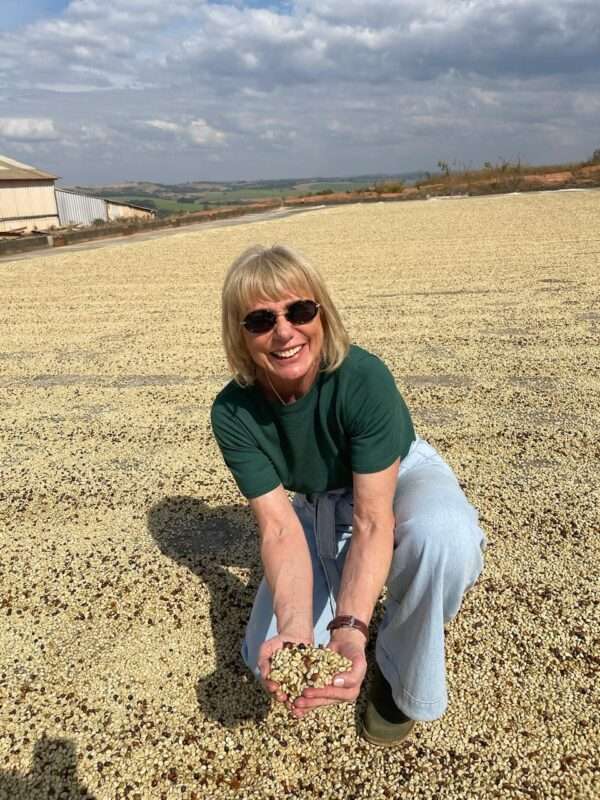
So, have you ever wondered where your coffee comes from? Let’s look at the countries that produce the most coffee. You’ll see how much of the world’s coffee comes from Brazil.
History Of Coffee Production In Brazil
Early Beginnings
Coffee, a loved drink, has an interesting history and a big economic impact. Brazil, known for its exciting culture and beautiful scenery, is very important in the global coffee industry.
In 1727, a Portuguese-Brazilian officer named Francisco de Melho Palheta brought coffee plants from French Guiana to Brazil. Palheta was sent to Cayenne, a place in French Guiana, to help settle a border dispute.
Farmers started growing coffee in Rio de Janeiro around 1770. They even started selling some to Europe. But it wasn’t until the 1800s that coffee production took off in Brazil. In 1800, they exported 1,720 pounds of coffee, and by 1820, that number had skyrocketed to 12,896,000 pounds.
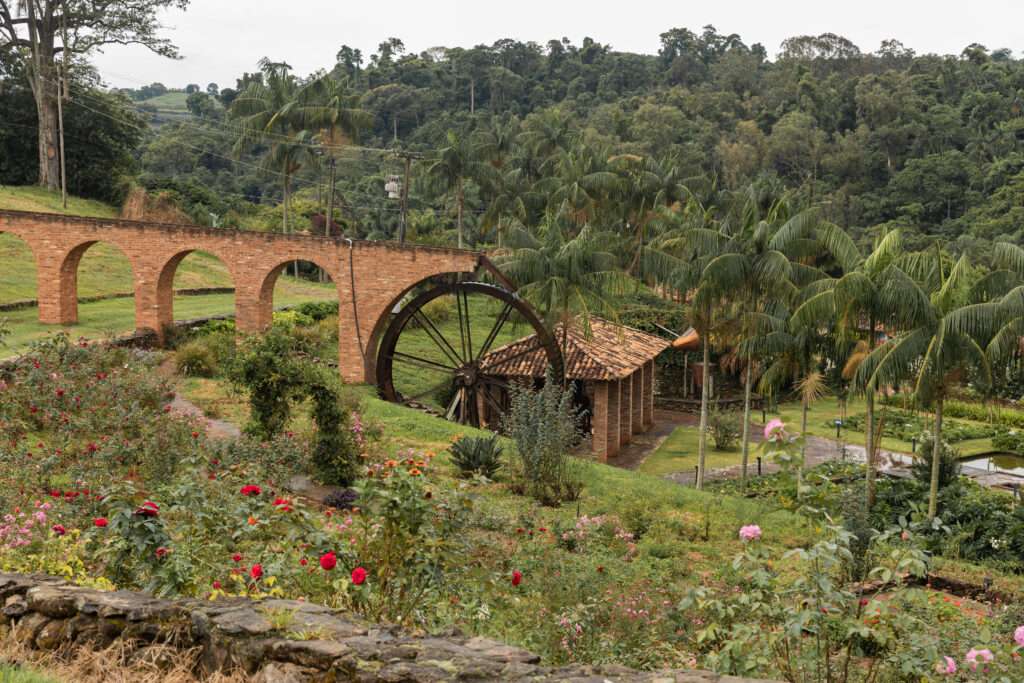
However, from a small beginning, coffee farming quickly grew throughout the country. As we say, the rest is history.
Growth And Expansion
The 19th century was a major time of expansion for Brazil’s coffee industry. Large coffee farms, called fazendas, were set up mostly in the southeastern areas of São Paulo, Minas Gerais, and Rio de Janeiro.
Brazil became the world’s largest coffee producer, during the mid-19th century because of good weather, rich soil, and lots of cheap slave workers. Is Brazil still the number one coffee producer in the world today?
Brazil’s Role In the Global Coffee Market Today
Leading Producer
Presently, Brazil produces 35% of all the coffee in the world. The coffee produced in Brazil is usually dry. Bourbon Santos is Brazil’s finest coffee.
The beans in the Arabica trees that produce Bourbon Santos coffee are very small and curly during the first three or four years of production.
As the coffee tree gets older, the seeds become bigger, and their quality decreases. People used to call them Santos flat beans. Bandeirante is a famous Brazilian coffee that is grown in an area often found in the United States.
In 2020, Brazil was a major coffee producer, growing a whopping 3.5 million metric tons of coffee beans. That’s more than many other big coffee countries like Vietnam, Colombia, and Ethiopia put together. The two main types of coffee grown in Brazil are Arabica and Robusta, with Arabica being the more popular kind.
Key Coffee-Producing Regions
Today, the Brazilian state of Minas Gerais reigns supreme as the coffee king. It produces nearly half, almost 50%, of all the coffee beans grown in Brazil. Other Brazilian states that brew a lot of coffee include Espírito Santo, São Paulo, and Bahia.
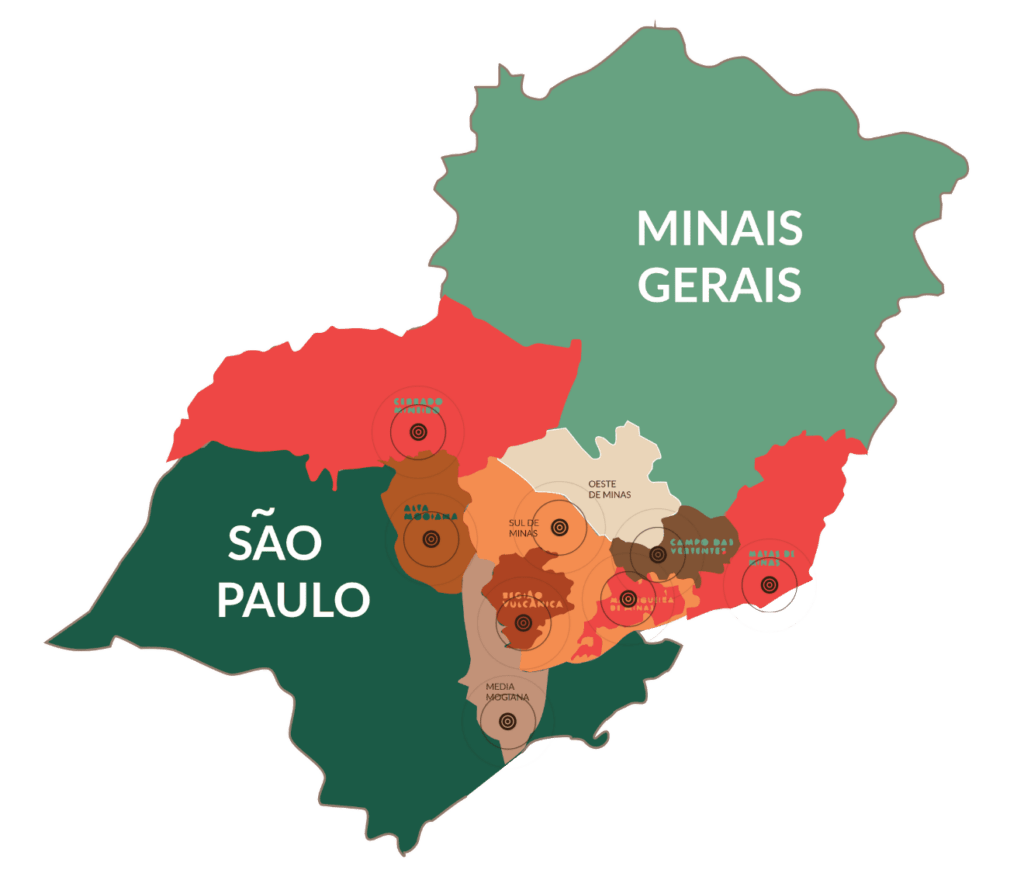
Different parts of Brazil have all sorts of weather and different levels of high ground. This variety is perfect for growing the best coffee beans.
That’s why most Brazilian coffee comes from big farms set up to grow tons of beans. They use special machines to pick and process the coffee after it’s grown.
Export Statistics
Brazil is the coffee-producing king. It grows and sells more coffee than any other country in the world. In 2020, Brazil shipped out a massive 38 million bags of coffee, each bag weighing 60 kilos (that’s about 132 pounds). That’s almost 4 out of every 10 coffees you drink around the world!
In 2022, Brazil shipped $8.86B in Coffee. That export made Brazil the 1st largest exporter of coffee in the world. That same year, it shipped 2.1 billion kilograms.
The United States loves Brazilian coffee. In one year, they bought over 432 million kilograms of it. Germany comes in second place, having bought almost 404 million kilograms of Brazilian coffee.
Last year, Brazil shipped a whole lot of coffee, almost 38 million, each weighing 60 kilograms. That means that nearly 4 out of every 10 coffees shipped in the world come from Brazil. The top places that love Brazilian coffee are the United States, Germany, Italy, and Japan.
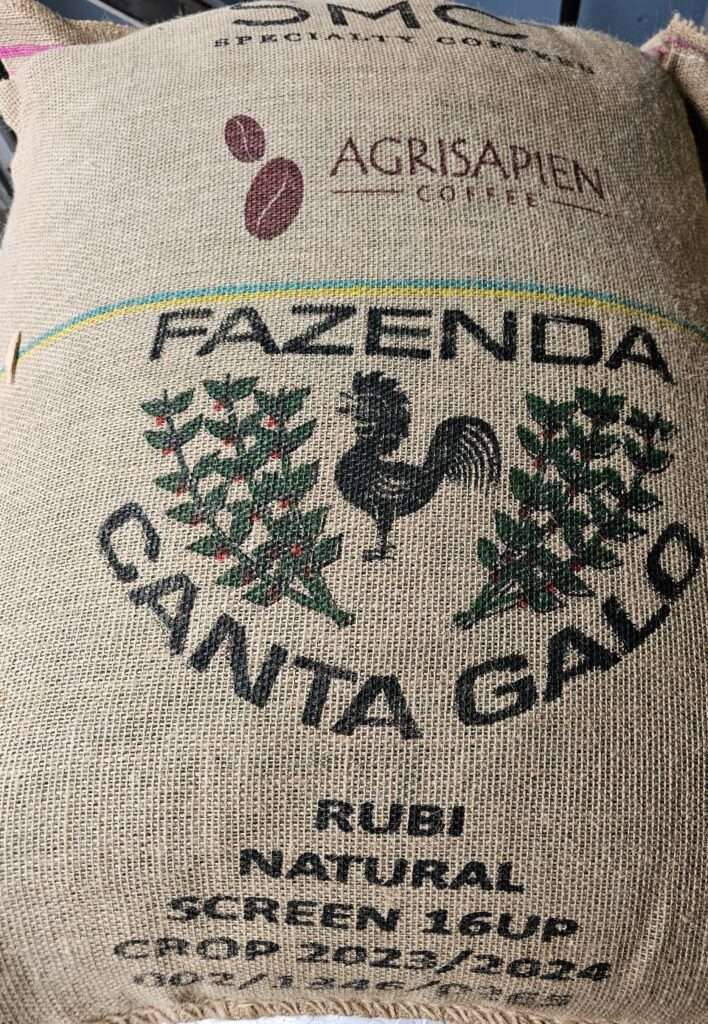
However, due to the rising demand for special coffees, producers are now investing in growing higher-quality beans, especially in southern Brazil where the weather is milder.
Brazil exports most of its coffee as:
- Green coffee
- Soluble coffee
- Roasted and ground coffee
- Concentrated and essential extracts
- Coffee residues
Key Factors Behind Brazil’s Coffee Dominance
There are many reasons why Brazil is the dominant coffee producer in the world. It has a good mix of history, geography, economy, and technology that combine to make the coffee industry the best.
Geographical And Climatic Advantages
Brazil isn’t just the world’s top coffee maker by chance. It has the ideal location and weather for growing the best coffee in the world. Here’s why:
- Sunshine and Warmth: Coffee plants grow best where there is plenty of sunshine and warmth. Brazil has the perfect subtropical climate for cultivating top-notch coffee beans. Warm days help the coffee cherries ripen, while cool nights give the beans a chance to develop rich flavor.
- Rain and Rest: Coffee plants need the right amount of regular rain to grow. Again, Brazil gets showers throughout the year. Consistent yearly rain keeps the plants thriving without drowning them. Additionally, a dry season lets the cherries dry out after picking. A perfect drying environment is another step for great coffee.
- Mountain Magic: Many areas where farmers grow coffee in Brazil have rolling hills and plateaus. These higher areas tend to have cooler temperatures and richer soil. This type of climate produces high-quality Arabica beans, the most popular type of coffee.
- Flat Lands, Big Farms: A lot of Brazil’s coffee country has flat land. Flat lands make it easier to use machines for planting and harvesting. The use of machines allows for large-scale coffee production, making Brazil a major supplier around the world.
These geographical and climatic advantages combine to make Brazil a global coffee powerhouse.
Technological Advancements
Advanced technology is helping Brazilian coffee farmers grow even more delicious beans. They’ve got new tools to pick the coffee faster, special sprinklers to keep the plants watered, and new ways to process the beans after picking. All this technology lets coffee farmers grow more coffee and make their job easier.
Not only that but researchers and farmers in Brazil are working together to make coffee plants disease-resistant. They’re also trying to figure out ways to grow coffee without hurting the environment.
Government Policies And Support
Brazil’s government gives coffee farmers a helping hand to keep their businesses strong. They offer things like money to help pay for costs (subsidies), loans with low interest rates, and even send experts to teach farmers new tricks (technical assistance).
This all helps coffee farmers stay in business and makes it more attractive for others to join in the coffee-growing fun.
They [the government] don’t just help farmers make money, they also show them how to grow coffee in a way that’s good for the environment. This helps keep Brazil’s reputation as a country that grows coffee responsibly!
Also, they create programs that help farmers grow coffee in ways that help the environment. These practices have helped maintain Brazil’s reputation as a responsible coffee producer.
Labor Force
Brazil stays on top of coffee production because of its amazing coffee farmers. Many families have been growing coffee for years and years, passing down their knowledge and skills from generation to generation. These farmers are like coffee experts – they know exactly how to grow and process the best beans.
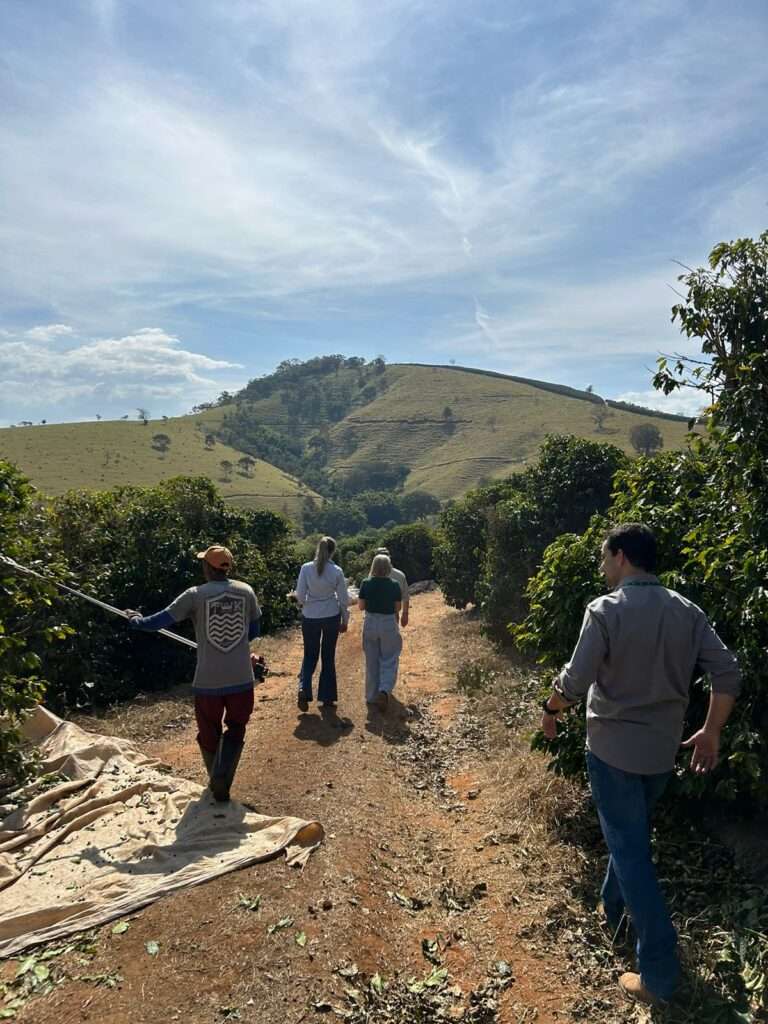
Even though machines help out a lot on coffee farms in Brazil, there’s still no replacement for good old-fashioned people power. These skilled farmers keep a close eye on everything to make sure the coffee beans grow up to be the best they can be.
Brazil has some of the strictest labor laws among coffee-producing countries, yet not all growers adhere fully. The legislation is complex, bureaucratic, and particularly burdensome for smallholders to comply with. Here’s where an entity ensuring ethical production by the exporting farmers is of fundamental importance to importers worldwide. Well-equipped cooperatives and exporters can make a difference in ensuring the coffee you drink comes from farmers who treat their workers with dignity and fairness.
Impact Of Brazilian Coffee On The Global Market
Brazil’s coffee has a significant effect on the whole world market. That’s because they grow so much of it. Brazil affects how much coffee there is to buy (supply) and how much people want it (demand). This can even change the price of coffee around the world.
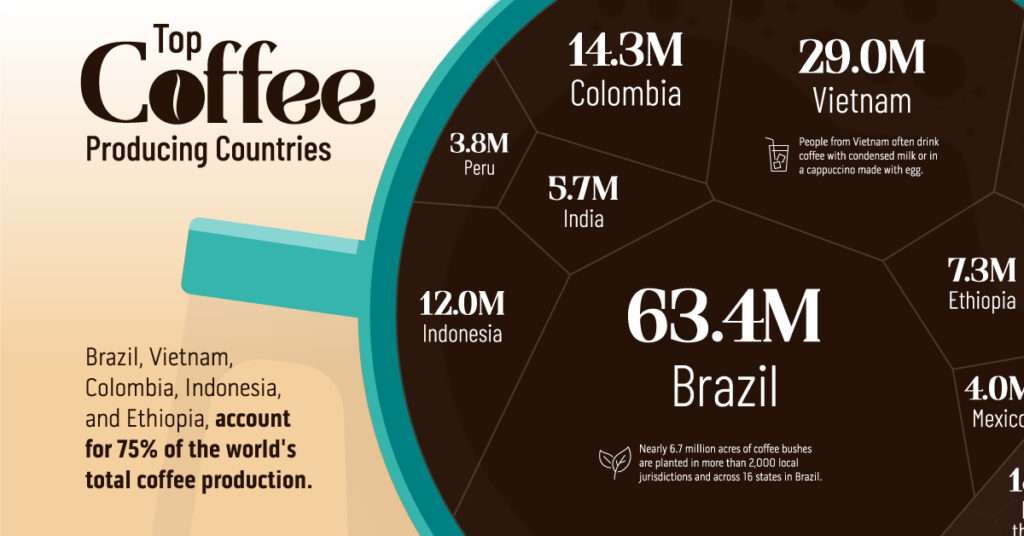
Since Brazil is a dominant coffee producer, it’s changed how people drink coffee around the world. They introduced “Cafezinho,” the small, strong coffee tradition, which is popular in many places now.
Also, because Brazil mostly grows beans for lighter roasts, it’s helped people everywhere enjoy different coffee flavors.
Brazil doesn’t just grow a lot of coffee, they also try hard to sustain best practices and fair trade. They focus on using eco-friendly methods that take care of the environment. Brazil’s push for organic farming is setting a great example for other coffee growers around the world.
Their focus on eco-friendly methods and fair trade means people everywhere are starting to care more about where their coffee comes from and how it’s grown. This is making high-quality, sustainable coffee more important than ever before.
Here are other areas where Brazilian coffee impacts the global market:
- Economic influence: Brazil’s coffee industry greatly affects both its own and the world’s economy. Coffee production creates jobs for millions of Brazilians, from farmers to factory workers. Money made from selling coffee abroad helps Brazil’s economy and supports many businesses.
- Market trends and prices: As the dominant global coffee producer, Brazil has a significant impact on world coffee trends and prices. Changes in Brazil’s coffee production, like bad weather or diseases, can affect the global coffee supply and demand. So, world coffee prices often change based on how stable Brazil’s coffee industry is.
- Coffee quality and standards: Brazilian coffee is known for its high quality and consistency. The country follows strict rules to make sure only the best beans are sold. Brazilian coffee is famous worldwide for its balanced taste, with the right mix of acidity, sweetness, and body.
Perception Of Brazilian Coffee In the International Market
Brazilian coffee is famous around the world for its delicious taste. Many people love it because it has a smooth flavor that can sometimes remind you of chocolate.
This makes Brazilian coffee a great choice for all sorts of coffee drinks, whether it’s mixed with other beans (blends) or enjoyed on its own (single-origin).
Brazil’s coffee is loved for two reasons: how it tastes and how it’s grown.
- Delicious taste: Brazilian coffee is known for being smooth and sometimes chocolaty, making it a favorite for many coffee drinkers. It’s great on its own or blended with other beans for different coffee drinks.
- Good for the world: More and more Brazilian coffee farmers are growing their beans in ways that are kind to the environment and fair to the workers. This makes coffee lovers feel good about enjoying that delicious Brazilian cup!
Brazilian coffee is a world-famous favorite for two main reasons: taste and responsibility.
- Tastes amazing: Brazilian coffee is known for being smooth and sometimes chocolaty. Its incredible taste makes it a perfect choice for all sorts of coffee drinks. For instance, it can be enjoyed on its own or blended with other beans to create custom flavors. That’s why you see it in so many espresso blends and specialty coffee shops.
- Good for people and the planet: More and more Brazilian coffee farmers use eco-friendly methods and fair trade practices. This means they’re taking care of the environment and treating their workers and customers well. So, you can feel good about enjoying a delicious cup of Brazilian coffee knowing it comes from a responsible source.
Since people all over the world love Brazilian coffee for its taste and how it’s grown, this confirms that Brazil is an important leader in the coffee industry.
Known For It’s Smooth & chocolaty Taste
Brazilian coffee is a world favorite for its delicious taste. Its smooth and often chocolaty taste makes it stand out from other coffees. This unique flavor makes it a top choice for many coffee lovers, especially those who enjoy a richer, deeper cup of coffee.
Beloved In Blends & Solo Sips
Brazilian coffee is a favorite for two reasons: it works well alone or mixed with others.
- Great on its own: Brazilian coffee has a special taste that many coffee lovers enjoy.
- Blends well: It also blends perfectly with other beans to create different coffee flavors.
Espresso Blends
Brazilian coffee is a key ingredient in espresso blends. It makes the espresso taste rich and smooth, not too bitter. This is why baristas (coffee makers) love it. Also, it helps create delicious espresso drinks that everyone enjoys.
Specialty Coffee Shops
Specialty coffee shops love Brazilian coffee. Here are the two main reasons:
- Great taste, great practices: Brazilian coffee is known for its high quality. In addition, many coffee farms are good for the environment and fair to their workers.
- Sets a good example: By featuring Brazilian coffee, these shops show how important it is to drink delicious coffee that’s also good for the planet.
Challenges Faced by Brazil’s Coffee Industry
Climate Change
Climate change poses a significant threat to Brazil’s coffee industry. Rising temperatures, unpredictable rainfall patterns, and the increased frequency of extreme weather events can adversely affect coffee production.
Droughts, frosts, and pests are becoming more prevalent, leading to reduced yields and lower-quality beans.
Economic Volatility
Economic volatility, including fluctuations in currency exchange rates and market prices, presents challenges for Brazilian coffee producers. The cost of production, transportation, and export can be influenced by economic instability.
The uncertainty of the farming economy affects the profitability of coffee farming. Additionally, competition from other coffee-producing countries adds to the economic pressures faced by Brazilian farmers.
Labor Issues
Despite advancements in mechanization, labor issues continue to impact Brazil’s coffee industry. The reliance on manual labor for certain tasks, such as selective harvesting, poses challenges related to labor shortages and rising wages.
Ensuring fair labor practices and improving working conditions are essential for the sustainability of the industry.
Environmental Concerns
Sustainable farming practices are crucial to mitigating the environmental impact of coffee production. Deforestation, soil degradation, and water pollution are concerns associated with large-scale coffee farming.
Efforts to promote agroforestry, organic farming, and efficient water management are necessary to address these environmental challenges.
Brazil’s Coffee: Brewing A Strong Future
In the future, Brazilian coffee will likely focus on making more special types of coffee beans. Brazilian coffee farmers will grow different varieties with unique flavors. They will continue to use eco-friendly methods and get certifications to prove it.
Since people want better coffee that’s also good for the environment, Brazilian farmers are growing special types of coffee beans with interesting flavors.
More and more Brazilian coffee is getting labels like “Rainforest Alliance Certified” and “Utz Certified.” This shows that Brazil cares about protecting the environment and treating workers fairly.
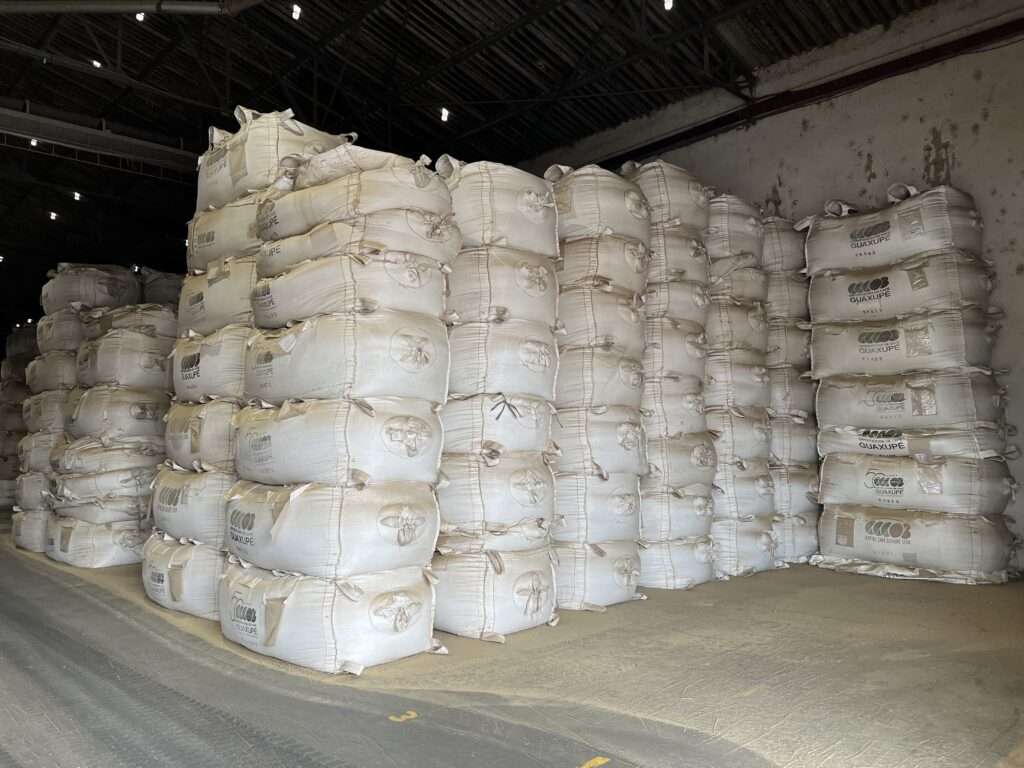
On top of that, countries in Asia and the Middle East, like China and the UAE, are starting to love premium coffee more. This means Brazil has a great opportunity to sell its coffee in those countries.
All this trend shows that Brazil is changing the way it sells coffee to the world. Now, they focus on high quality, being eco-friendly, and trying new things.
Other future trends include:
- Technological Innovations: Brazil’s coffee industry can thrive in the future by using new technology. This includes developing coffee plants that can handle changing weather, using smart farming techniques, and taking care of the environment while growing coffee. Computers and other digital tools can also help track and improve how coffee is produced, making it faster and greener.
- Diversification and Value Addition: Brazil’s coffee industry can grow by offering more than just regular coffee. They can target specific groups of people who want special types of coffee, like unique or eco-friendly options. They can also make new products using coffee beans, like drinks, beauty products, or vitamins! This will bring them more money in the long run.
- Global Collaboration: Brazil can team up with other coffee growers around the world to be even more successful. By sharing ideas and ways of doing things, they can all find better methods to grow coffee that’s good for the environment. Working together to fight climate change, sell coffee more easily, and trade fairly helps everyone who grows coffee.
Conclusion
Brazil is the dominant producer of coffee. It has the perfect weather for growing coffee. It uses new technology, gets help from its government, and has abundant skilled farmers. All these things add up to Brazil being number one in coffee production.
Brazil’s coffee industry is strong, even though it faces climate change and ups and downs in the economy. Their coffee is superior. It affects world coffee prices, what kind of coffee is popular, and how good it needs to be.
Brazil can stay on top of the coffee production game by using new technology, offering more than just regular coffee, and working with other coffee growers worldwide. This will help them keep their dominance and remain a major player in the industry for a long time.
References
- Coffee Board of Brazil. (2021). Coffee Production in Brazil: Historical Overview. coffeeboard.org.br
- International Coffee Organization. (2020). Coffee Market Report. ico.org
- Ministry of Agriculture, Livestock and Food Supply. (2021). Brazilian Coffee: A Comprehensive Guide. agriculture.gov.br
- Specialty Coffee Association. (2020). The Impact of Climate Change on Coffee Production. sca.coffee
- World Bank. (2021). Coffee Production and Economic Development worldbank.org
- coffee statistics
- History Of Coffee In Brazil
About Us
Agrisapien Traders is more than just an importer of coffee - we are a passionate beacon for coffee enthusiasts. Each bean we import tells a story of rich flavors and hardworking hands that nurtured it.
